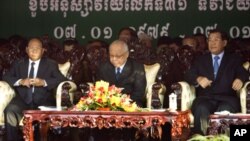An increasing number of Cambodians are dissatisfied with the direction the country is moving toward, according to results from a nationwide survey by the Asia Foundation.
The foundation interviewed 1,000 people face to face in May and June of this year—prior to a political deal struck by the ruling party and opposition. Of those interviewed, 59 percent said they think the country is going in the wrong direction.
The poll focused on people’s attitudes toward the government, particularly regarding violent crackdowns on workers and land activists in recent years. Its results show a major shift toward dissatisfaction compared to previous years.
“What we compared was the national mood, how people felt 10 years ago, and how people feel today,” Silas Everett, the foundation’s Cambodia representative, said. “Ten years ago, people thought that the election was free and fair, compared to the 2013 national election.”
Government spokesman Phay Siphan denied the findings of the report, saying questions must have been made to bring about answers the foundation wanted to hear. “I do not understand their questions, the system of questioning and evaluating,” he said. “The questions should be clearly understood by the people, and not the kinds of questions that lead to answers projected by questioners. I do not agree with this.”
Nevertheless, Everett said the poll signaled a shift that the government would benefit from understanding. “These findings are a unique lens into Cambodian citizen views and suggest rising expectations of a society in a rapid economic transition,” he said.
The poll came nearly half a year after major demonstrations and a deadly crackdown by the government in early January, and following nearly a year of political deadlock between the ruling Cambodian People’s Party and the opposition Cambodia National Rescue Party.
In it, 59 percent of respondents showed little support for the 2013 elections unless election reforms were made.
Hang Puthea, director of the election-monitoring group Nicfec, said the poll should be viewed as a “mirror” by the government. But he also cautioned against quick changes.
Election reforms must be made, he said, but they should be made gradually, especially at the National Election Committee, which has been roundly criticized as biased toward the ruling party. “Waiting for an NEC that is 100-percent neutral I think would be hard, and sometimes can hamper national development,” he said.
The survey also showed a lack of understanding of democratic principles.
Hang Puthea said education and training are needed to help people exercise their rights. Those rights and principles should be implemented and followed by the government, “to make people understand what democracy is,” he said.
“Implementation of democracy has to be done through the higher to the lower class,” he said. “The higher class is the role model.”




